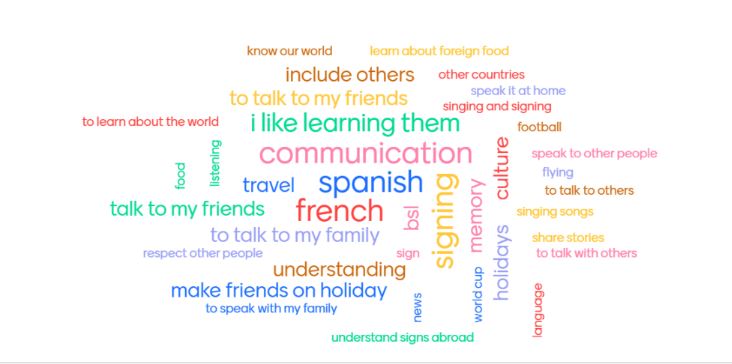Latest News:
INTENT
At Pendle Community High School, learning a language provides an opening for our pupils to explore other cultures and enable communication with their deaf peers. A high-quality language education aims to foster pupils’ curiosity and deepen their understanding of the world. The teaching aims to enable pupils to express their ideas and choices in another language and to understand and respond to its speakers, both in sign, speech and where appropriate, writing. It also provides opportunities for pupils to communicate for practical purposes and we aim to give the pupils access to language opportunities and experiences. Learning a language enriches the curriculum, providing excitement, enjoyment and challenge for pupils and teachers, helping to create enthusiastic learners and develop positive attitudes to language learning throughout life.
IMPLEMENTATION
MFL at Pendle Community High School has been designed to progressively develop pupils’ use of common words and phrases or the pupils’ experience of the languages studied (French/ Spanish or BSL). The pupils are taught in a weekly discrete lesson but are offered opportunities throughout the week to use their language skills to give them meaningful and purposeful interactions. The learning will start at basic noun and article level and will teach pupils how to formulate short phrases. Then where appropriate with pupils’ individual progress, they will be exposed to much longer text and will be encouraged to formulate their own, more personalised responses based on a much wider bank of vocabulary, linguistic structures and grammatical knowledge. Pupils will continuously build on their previous knowledge as they progress in their language journey. Previous language learning will be recalled, reviewed and consolidated whenever possible in line with an individual’s abilities and learning needs.
We use a variety of the following techniques to encourage children to have an active engagement with the language of study:
- Games – in order to develop vocabulary through repetition, reading, writing, signing, speaking and listening skills.
- Role-play – these should relate to the situations the children may find themselves in the future.
- Action songs and rhymes – to develop phonetic skills, memory skills and to further vocabulary.
- Quality study resources materials.
- Physical movements (sign) – to associate vocabulary with kinaesthetic learning.
- Reading and writing quality materials
- ICT programs and websites; the use of ICT to develop communication skills
- We make the lessons as entertaining and enjoyable as possible, as we realise that this approach serves to develop a positive attitude in the children to the learning of a languages.
- Peer/ mentors to model and support other pupils learning a new language.
- Language clubs.
Independent learners are encouraged to be inquisitive, ask/sign questions and when appropriate work independently to research the language being covered. The curriculum is designed to provide challenge and all activities will be appropriately matched for individual learning, as well as encouraging communication with others and an appreciation of the world around them.
Supported and experiential learners follow a thematic approach, where many areas of the curriculum are connected and integrated within a theme. These classes work in smaller groups, they use Makaton, Moon, Deaf Blind Manual, Braille and augmentative and alternative communication (AAC) to communicate with others. Their learning is met primarily through experiences and activities which are multi-sensory and stimulate learning through kinaesthetic approaches and are supported through structure and routines. This curriculum is used to enhance early learning and development in pupils across school who present with sensory issues and those who learn best via a highly experiential, multi-sensory approach.MFL uses a range of resources, including online programs, songs and language games. Pupils also have the opportunity to sign to staff and peers throughout the day.
IMPACT
As a pupil progresses through the school, they develop an understanding and appreciation of the use of language and communication. Pupils will gain confidence in communicating with others as has been evidenced on Erasmus trips overseas. Teachers have high expectations and evidence of this is demonstrated in progress data and from 2023 KS4 accreditation results. Impact is also recognised in pupils’ contributions, questions and enthusiasm in lessons, observed use of signing with staff and peers, participation in themed days and assemblies where pupils demonstrate what they know and remember using appropriate signs, words and phrases.
Pupils further develop their abilities in the 4 key components of the curriculum as well as improving reading and writing skills. The language proficiency that pupils will attain will vary but all will show progress from their individual starting points which will be demonstrated through communication with each other and staff in the target language.
MFL Lead
Stephanie Curtis
scurtis@pchs.lancs.sch.uk
Pupil Voice: Why we think it is important to learn modern foreign languages in school.

CONTACT US
Pendle Community High School & College
Pendle Vale Campus, Oxford Road, Nelson, Lancashire, BB9 8LF
Tel: 01282 682260
Headteacher: Debra Grogan
Chair of Governors: Trevor Ashton (Address c/o above)
Receptionist: Sophie McCamon
E-mail: smccamon@pchs.lancs.sch.uk
SENDCO: Stephanie Curtis
Email: scurtis@pchs.lancs.sch.uk
CONNECT WITH US
Paper copies of the information on our website can be requested via email.

